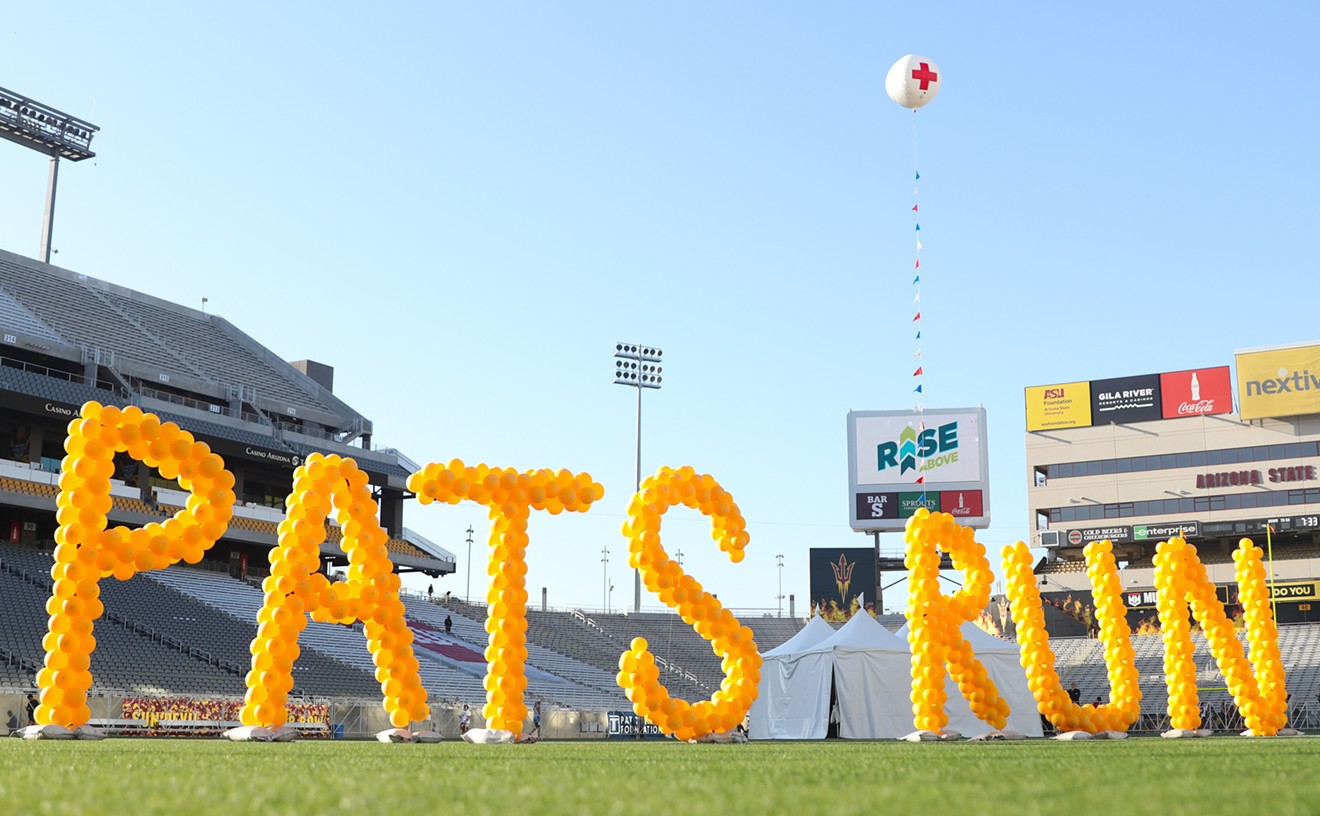Wyatt Earp -- the swim coach, not the dead cowboy -- may pull on chaps for pay and can quote his famous ancestor on any occasion, but he's not above admitting that old-time cowboys were terrorists and that sometimes being Wyatt Earp really cramps his style.
New Times: How come you're not wearing a cowboy hat right now?
Wyatt Earp: Because I'm sitting down. Because I'm indoors. Because I seldom dress Western when I'm not out riding.
NT: Why is your name Wyatt Earp?
Earp: I was born in 1945, and my folks didn't anticipate the fame that my name and our family history would have. They were just giving me a family name.
NT: Oh, come on.
Earp: No. You have to remember that until 1955, when Hugh O'Brian came on TV with his [The Life and Legend of Wyatt Earp] show, the name was famous but it wasn't a household name. After the show was a big hit, I learned quickly the importance of a sense of humor.
NT: Things must get interesting when you write a check or leave a message saying, "Hello, this is Wyatt Earp . . ."
Earp: I can't be paged in an airport. People have tried, and airport employees always refuse because they think it's a joke. Plane reservations are always made in my wife's name.
NT: Were you forced, as a child, to wear a ten-gallon hat and learn to draw a gun?
Earp: My heroes growing up were race-car drivers and astronauts. I was raised in Indiana, and I came out West to go to college and everything changed. Everyone expected me to wear a six-shooter.
NT: But you do this dress-up thing, right? Where you dress up like your great-uncle and people pay you to pretend to be him?
Earp: Something like that. Several years ago, Hugh O'Brian contacted my wife, Terry, and asked her to write a play about Wyatt Earp for him. He wanted to do a bio-drama and travel the globe with it. But Mr. O'Brian is in his 80s and totally deaf because of all those loud TV gunfights. So it wasn't going to happen. But Terry had written the play, and she wanted to see what it would look like on stage. We figured Wyatt Earp was a worn-out subject, and we'd lose money and it would just play the one night. But instead it sold out, and we kept extending the run. The play ended up in theater festivals all over world, and now it's got a life of its own.
NT: Many members of the Earp family were born in Pella, Iowa. That's a nice name for a town.
Earp: It is. Wyatt grew up there. And they have an amazing tulip festival every year in Pella.
NT: There's a joke in there somewhere, but it escapes me. Now, I read where the gunfight at the OK Corral lasted only 30 seconds. So why's it so famous?
Earp: Probably in part because most of the time in the Old West, guys shot each other in the back. The gunfight at the OK Corral -- which, by the way, didn't take place at the OK Corral, as I'm sure you know --
NT: Why, of course. Everyone knows that.
Earp: That gunfight was one of the few, if not the only, face-to-face gunfights between law enforcement officers and bad guys back then. But what it amounted to -- well, Wyatt would have called it just another street fight in Tombstone.
NT: So you're saying that cowboys were just the 19th-century equivalent of gang members?
Earp: Worse. They were the terrorists of 1880. Cowboys were 13-year-olds who'd gone into the Civil War and been taught to kill and pillage. Then they came out of the war and moved west, and were completely unemployable. These were young men who were deeply emotionally wounded from the war. They worked in Texas, herding cattle, but they still had that war mentality -- pillaging and plundering. They were kicked out of Texas, and they moved to New Mexico and Arizona, where they terrorized people there.
NT: So, then, why the mystique surrounding guys like Wyatt Earp, Jesse James, and Johnny Ringo?
Earp: Because Americans love our bad guys. Bad guys carry attitude, and that's always entertaining.
NT: I read that Wyatt Earp was a consultant on Hollywood westerns late in life. And that he was also a bodyguard and a boxing referee. I thought cowboys poked cattle or something. Being a bodyguard doesn't sound particularly Old-West-bandito to me.
Earp: He was a bodyguard for [William Randolph Hearst's father] George Hearst. And he refereed fights back when it was a respectable sport. He was a buffalo hunter -- there's your Old West job title for you -- and there's not much to do in buffalo camps but play poker and learn to box. Wyatt was a popular referee because he had a tremendous obsession with honesty.
NT: He could have been a journalist! Hey, I heard that Bob Boze Bell's new book about Wyatt Earp "dethrones Tombstone's most famous resident." What does that mean?
Earp: I don't know. I read it cover to cover and didn't find anything objectionable.
NT: Why does Bell have Earp on the cover of this month's True West magazine with a big red X through his face?
Earp: It's all hype. We love to scandalize our heroes. Look at it this way: Ten years after you die, I'm going to write a play about your life. In my research I find out some of the mistakes you made in your 20s --
NT: Like some of my hairstyles?
Earp: Or whatever. And I use those mistakes to tell your whole life story. How would that be?
NT: Well, it would be all right with me, as long as this play wasn't a musical. And if I could be thinner and prettier, that would be good.
Earp: You know, a few years ago, Arizona Highways did an article where they analyzed Wyatt's handwriting. They determined that today he would not have fit well into the corporate structure.
NT: Huzzah.
Earp: The handwriting analysts determined that he'd be an entrepreneur, which is really what he was. They said he would probably coach athletics, and would have participated in the performing arts. And that he'd probably have worked as a life insurance salesman. I spent 35 years at a life insurance company. I've been coaching swimming for 45 years. And I'm an actor.
NT: That's a little creepy.
Earp: A little creepy? Believe me. You have no idea.










